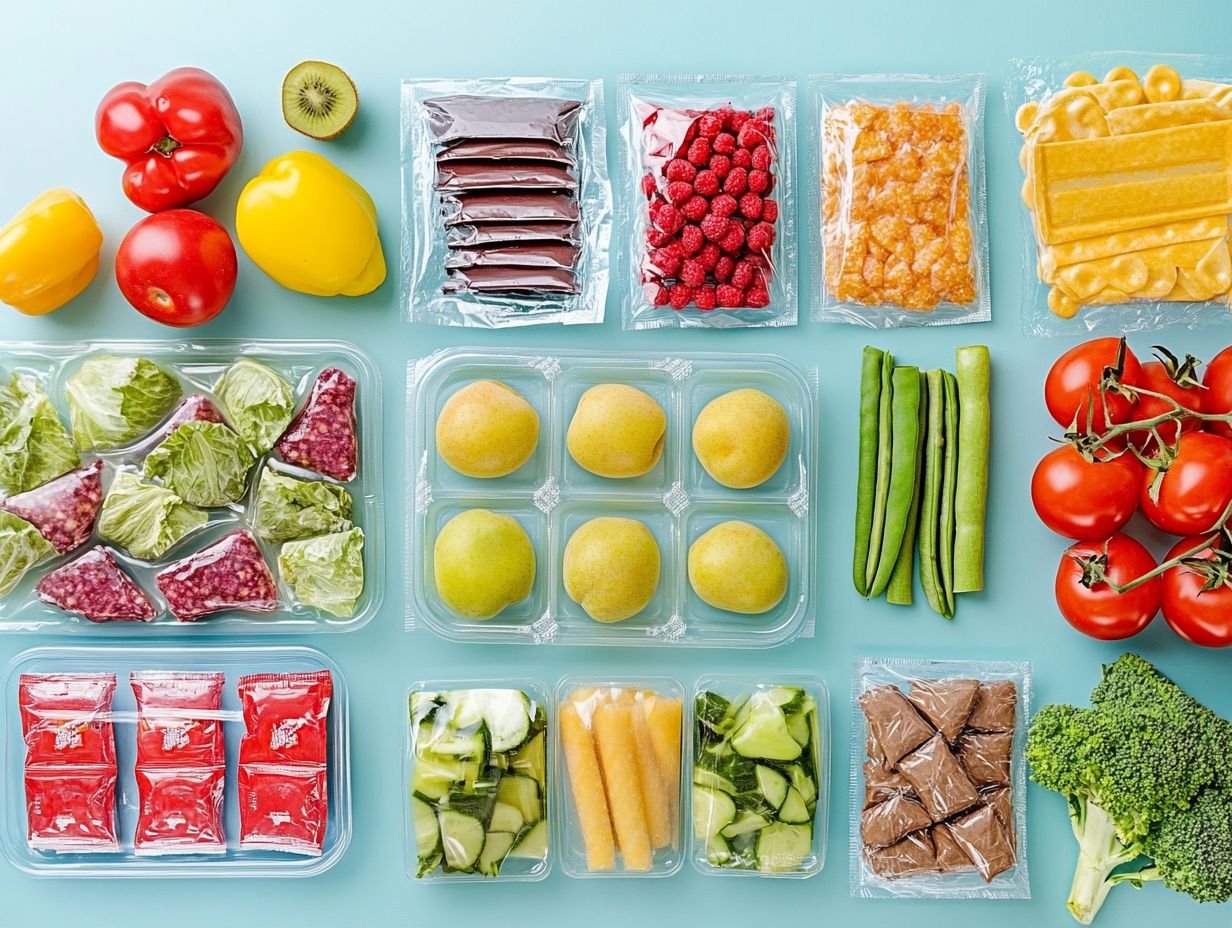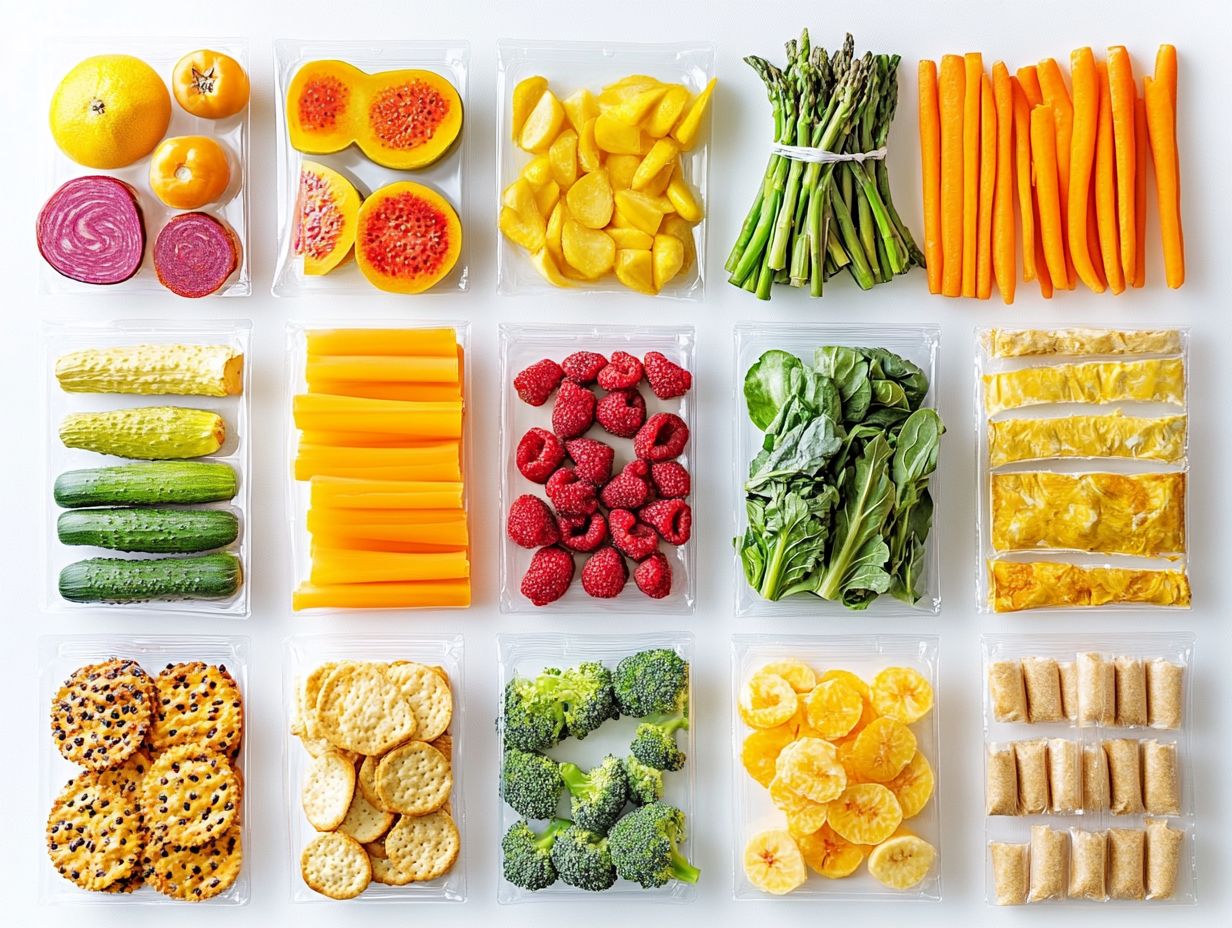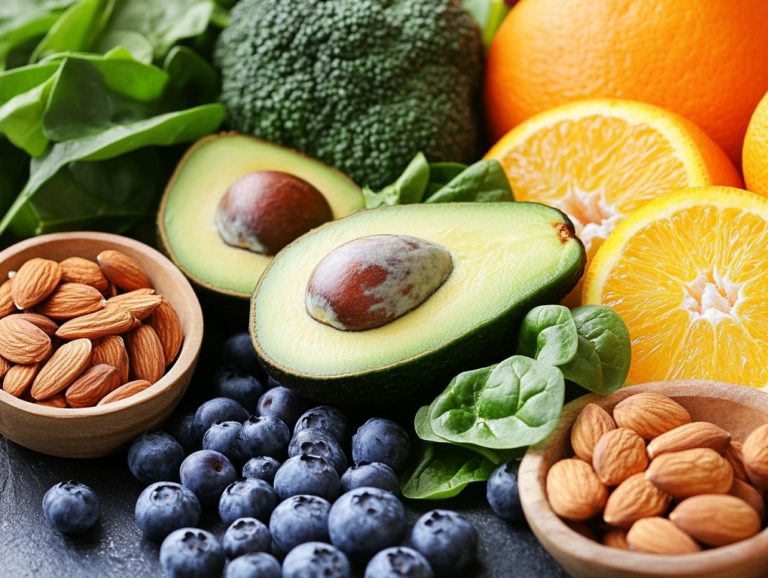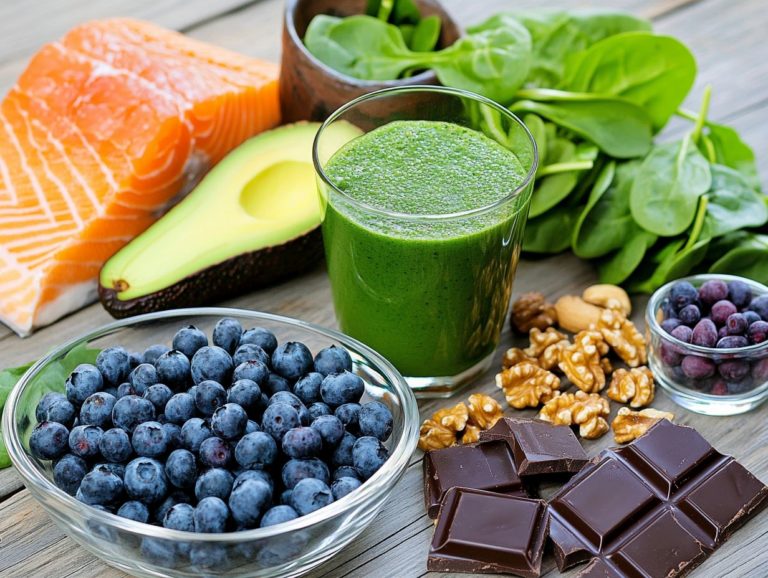What Is the Difference Between Whole and Processed Foods?
In today s fast-paced world, grasping the distinction between whole and processed foods is essential for making informed dietary decisions.
This article delves into the definitions and examples of both food categories, illuminating their nutritional differences. You ll discover the benefits of whole foods and the drawbacks of processed options, as well as how each influences your health.
You ll find practical tips for incorporating more whole foods into your diet, empowering you to embrace a healthier lifestyle.
Contents
Key Takeaways:

Whole foods are unprocessed and provide vital nutrients. Processed foods are often altered and can lack essential nutrients.
Whole foods can improve overall health, while excessive consumption of processed foods can lead to health issues like obesity and heart disease.
Incorporating whole foods into your diet may seem challenging, but small changes like choosing fresh produce and whole grains can make a significant difference in your health and well-being.
Understanding Whole Foods
Grasping the concept of whole foods is essential for making informed dietary choices, especially in light of pressing health concerns like obesity and chronic diseases.
Whole foods those minimally processed gems retain their nutrients and play a pivotal role in enhancing overall health. This understanding is crucial because it can transform your eating habits!
Whole foods extend your healthspan, or the period of life spent in good health, and help mitigate the risks linked to added sugars and calorie-laden processed options.
Organizations like the GWI Nutrition for Healthspan Initiative recommend including nutrient-dense choices such as fruits, vegetables, and legumes in your daily diet.
Definition and Examples
Whole foods are your go-to for natural, minimally processed sustenance that keeps their nutrients intact, delivering essential vitamins and minerals.
You ll find a delightful array of options among these foods:
- Fresh fruits are brimming with antioxidants.
- Vibrant vegetables are teeming with fiber.
- Whole grains provide that long-lasting energy you crave.
- Legumes are packed with protein, making them a powerhouse for your diet.
Each category plays a pivotal role in achieving a balanced diet:
- Fruits and vegetables are crucial for their impressive nutrient density.
- Whole grains serve as stellar sources of complex carbohydrates, keeping your energy levels steady.
- Legumes bring essential proteins and healthy fats, bolstering muscle health and overall well-being.
By incorporating these foods into your meals, you’re not just promoting physical health; you re also supporting weight management and reducing the risk of chronic diseases.
Understanding Processed Foods
Understanding processed foods is essential for fully appreciating their health impacts, especially compared to the more nutrient-dense whole foods.
Many processed foods are packed with unhealthy additives, including added sugars and artificial ingredients. These empty calories can lead to obesity, chronic diseases, and other significant health concerns.
Organizations such as the GWI Nutrition for Healthspan Initiative strongly advocate for cutting back on these foods, emphasizing the importance of making better dietary choices for your well-being.
Definition and Examples
Processed foods are those that have been transformed from their original state through methods like canning, freezing, or the addition of preservatives. These modifications give rise to a variety of products, including tempting snacks like chips and cookies, ready-to-eat meals such as frozen dinners or instant noodles, and sugary drinks like sodas and energy beverages.
While these convenient options can save you time, they often come with notable downsides. Many processed foods are packed with added sugars, which enhance flavor but lead to calorie-rich diets, potentially increasing health risks like obesity and diabetes.
By grasping these implications, you can make more informed choices about your dietary habits.
Start swapping out processed foods for whole foods today!
Nutritional Differences Between Whole and Processed Foods

Whole and processed foods have significant nutritional differences. These differences can affect your dietary choices and overall health.
Whole foods generally boast higher nutritional value. They are packed with essential vitamins, minerals, and fiber. In contrast, processed foods often fall short in these nutrients and frequently contain elevated levels of added sugars and unhealthy fats.
This disparity is not merely academic; it has direct implications for your health. You may face increased risks of obesity and chronic diseases, such as type 2 diabetes and cardiovascular issues.
Benefits of Whole Foods
Whole foods offer a wealth of benefits. They play a pivotal role in cultivating a healthier lifestyle and mitigating the risks of chronic diseases like obesity and type 2 diabetes.
These foods think vibrant fruits, crisp vegetables, hearty whole grains, and nourishing nuts and seeds are rich in nutrients. They provide essential vitamins and minerals without the excess calories, ensuring your body functions at its best.
Take berries, for example. They not only tantalize your taste buds but also pack a powerful punch with their antioxidant properties. These properties help neutralize free radicals and reduce inflammation.
Whole foods are also rich in dietary fiber. This fiber supports digestion and promotes a satisfying feeling of fullness, aiding in healthy weight management.
By incorporating more whole foods into your daily meals, you can significantly enhance your well-being. This can elevate your energy levels and pave the way for long-term health.
Drawbacks of Processed Foods
The drawbacks of processed foods are significant. They often lead to various health complications due to their empty calories and excessive added sugars.
Many processed foods are stripped of essential nutrients. This leaves you with little more than calories, which can lead to unwanted weight gain! Obesity rates have tripled globally since 1975, according to the World Health Organization.
Consistent consumption of such foods has been linked to increased risks of chronic illnesses like heart disease and diabetes. Recent studies reveal that diets high in processed foods can lead to insulin resistance, creating a challenging cycle that s hard to escape.
Avoiding these convenient yet harmful options is a crucial step toward enhancing your overall well-being.
Impact on Health
The impact of dietary choices on health is profound and far-reaching. Whole foods play a crucial role in enhancing your health by fostering a balanced gut microbiome and lowering the risk of chronic diseases such as obesity and cardiovascular issues.
Processed foods can also harm your health. Understanding these relationships is crucial for your health as you navigate your dietary choices.
How Whole and Processed Foods Affect the Body
Whole foods significantly enhance your well-being. They promote a healthy gut microbiome and supply essential nutrients, while processed foods tend to disrupt this delicate balance.
Research reveals that whole foods, brimming with fiber, vitamins, and minerals, foster the growth of beneficial gut bacteria that are vital for digestion and immune function. In contrast, the excessive sugars and unhealthy fats in processed foods can lead to an imbalance in your microbiome, encouraging the proliferation of harmful bacteria.
This disruption has been linked to a range of chronic diseases, including obesity, diabetes, and cardiovascular issues, as supported by studies published in esteemed journals.
Experts underscore the importance of incorporating a diverse array of whole foods into your diet. This supports gut health and helps reduce the risks associated with chronic conditions over time.
Making the Switch to Whole Foods

Transitioning to whole foods can be a transformative journey for you. Especially if you’re aiming to elevate your dietary choices and overall health.
Prioritizing nutrient-dense options like fruits and vegetables aligns your eating habits with trusted guidelines. This can improve your nutrition and promote a longer, healthier life.
This shift aids in effective weight management while significantly reducing the risks linked to processed foods.
Tips for Incorporating Whole Foods into Your Diet
Incorporating whole foods into your diet can be easily achieved with a few practical tips and strategies. Focus on nutrient-dense choices.
If you’re looking to elevate your meals, starting with a structured meal plan can be a game changer. Outline a week s worth of meals to ensure you embrace a diverse array of fruits, vegetables, whole grains, and lean proteins.
Creating a shopping list based on this plan will streamline your grocery shopping. It helps you avoid those tempting impulse buys that steer you away from whole food options.
When it comes to cooking, consider methods like steaming, roasting, or stir-frying. These techniques preserve nutrients and enhance the flavors of wholesome ingredients.
By integrating more whole foods into your everyday meals, you foster better health and well-being. Each bite can become a nourishing experience.
Choosing a Healthier Diet with Whole Foods
Choosing a healthier diet that emphasizes whole foods is crucial for enhancing your overall well-being and longevity. This shift boosts your nutrient intake and promotes a longer healthspan.
Whole foods are abundant in vitamins, minerals, and antioxidants. These support optimal bodily functions and nurture a thriving gut microbiome essential for immunity and digestion.
By prioritizing natural ingredients over processed options, you’ll enjoy increased energy levels and improved mental clarity. Embracing whole foods can supercharge your life and help you thrive for years to come!
Watch this video to learn more about the benefits of whole foods!
Frequently Asked Questions
What Is the Difference Between Whole and Processed Foods?
Whole foods are in their most natural form, without any added processing. Processed foods have undergone some form of processing, such as cooking, freezing, or adding preservatives.
Why Are Whole Foods Better Than Processed Foods?

Whole foods are generally healthier than processed foods. They contain more nutrients and less added sugars, fat, and preservatives.
They are less likely to cause negative health effects, such as weight gain and chronic diseases.
What Are Some Examples of Whole Foods?
- Fruits
- Vegetables
- Whole grains
- Nuts
- Seeds
- Lean proteins such as chicken and fish
What Are Some Examples of Processed Foods?
- Packaged snacks
- Canned foods
- Frozen meals
These foods often contain added sugars, preservatives, and artificial ingredients, and may be lower in nutrients compared to whole foods.
Are All Processed Foods Unhealthy?
Not all processed foods are necessarily unhealthy. Some, like frozen fruits and vegetables, can retain their nutrients and be convenient and healthy options.
However, it is important to carefully read labels and avoid processed foods that are high in added sugars, unhealthy fats, and artificial ingredients.
Ready to transform your diet? Start by making small changes today!
How Can I Incorporate More Whole Foods Into My Diet?
Incorporating whole foods into your diet is easy and rewarding! Focus on meals made with fresh ingredients.
Make simple swaps, like choosing whole grain bread over white bread. Opt for fresh fruits and veggies instead of packaged snacks.
Planning and preparing meals at home is a fantastic way to increase whole food intake. Get creative in the kitchen and enjoy the benefits of wholesome eating!





